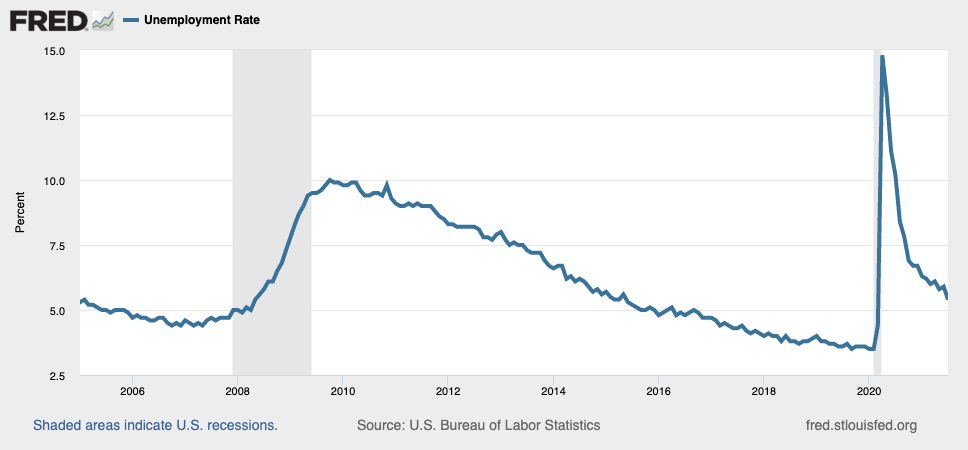Recession Dating
Let me just say from the start that this is not a special issue on dating during pandemics or during a slowdown in the economy. The last person you should take relationship advice is from economists since we’d much rather talk about “optimizing romance” and we serious talk about whether gift-giving is really worth it. On the other hand, you could read a book on how online dating exemplifies economics or check out this journal article on learning economics using concepts from dating.
The real purpose of this issue is that you may have heard that the pandemic-induced recession ended last summer (June 2020) despite simultaneous news reports about the ongoing struggles facing the economy since then. It seems like every other week has something that is in short supply, whether be it workers or rental cars. Sometimes it’s hard to accept that a recession is over while it still feels like you’re in the middle of a recession. Consider this issue of the Monday Morning Economist as more of an educational opportunity than one that’s necessarily about current events.
It's a recession when your neighbor loses his job; it's a depression when you lose yours. (Harry S. Truman, supposedly)
About a month ago, the National Bureau of Economic Research (NBER) announced that the most recent recession lasted just 2 months, from April 2020 to June 2020. The NBER is the organization responsible for ‘recession dating’ in the United States despite not being an official government organization. The dating committee is comprised of prominent faculty from around the United States, and the group is largely seen as one of the preeminent groups of research economists. The group sometimes comes under pressure because it takes a while for a recession to be ‘dated’ but that’s often because the committee wait to make sure the economy is in a consistent recovery. There is no official requirement for a recession, but the most common method taught in principles is two consecutive quarters of reduced output (negative GDP growth).
Part of the reason this recession was dated so much shorter than previous ones was that the cause wasn’t financial, but rather a public health issue. Because this is such a different type of recession, the output decline was more similar to a one-time shock rather than some sort of ongoing issue that affected financial markets, like a decrease in housing prices. The speed of the collapse was so different that the pandemic induced a sudden shutdown of the global economy, which is actually what policy makers wanted. In previous recessions, the goal was to get people spending more money, but this recession wanted people staying home initially. For some great insight into the fiscal and monetary response to this recession, check out Claudia Sahm’s newsletter.
The particular dates of the recesssions are actually fairly arbitrary. I don’t mean that to discount the amount of work the NBER puts into dating recessions, but in the grand scheme of people’s lives it make relatively little difference. Just because the recessions is officially over, the US economy still has a long way to go to get back to where it was before. This isn’t unique to the most recent pandemic either: the unemployment rate peaked 4 months after The Great Recession was officially marked as having been completed.
The dating process serves as more of a matter of historical record than really anything else. For educators, it’s a chance to look back reflectively and talk about the role of government response during recessions. The dates themselves are more of an explanatory tool than anything else. Hopefully we don’t get to a point in the future where students look back and think this pandemic wasn’t that bad becuase the economy was only in a 2 month recession.
The U.S. economy shrank by 5% in the first quarter of 2020 and then by 31.4% in the next quarter [US Bureau of Economic Analysis]
One of the first recessions in the United States occurred in 1797 [Curott and Watts, 2016]
The first NBER-dated recession occured from June 1857 to December 1858 [National Bureau of Economic Research]
The Great Depression lasted 3 years and 7 months [National Burearu of Economic Research]
Week 32 is over and I’ve checked in a total of 50 books so far this year. The past week has really been dedicated to getting ready for classes again, so my numbers will slow down. Over the past couple of years, I’ve finished with a little over 80 books, but I’m not sure if that will happen this year!
This past week I read Clubbie: A Minor League Baseball Memoir by Greg Larson. I’ve gotten into a minor league baseball kick lately and wanted to read a bit more about what goes on behind the scenes. Larson was a clubhouse attendance (clubbie) for the Aberdeen Ironbirds and wrote about his experience. It was neat to read because I visited Aberdeen earlier this summer and even recognized some of the players he mentioned in the book.





